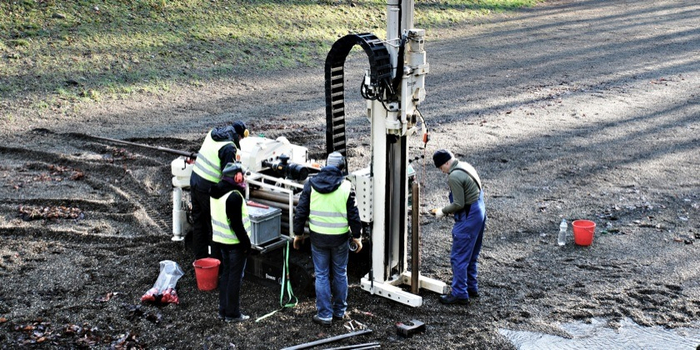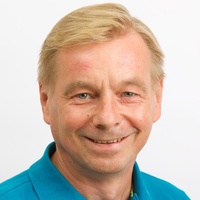Staff
Mario Schirmer


Prof. Dr. Mario Schirmer
About Me
Associate Professor
Centre for Hydrogeology, University of Neuchâtel, Switzerland
PhD School Water Earth Systems
Research Interests
Hydrogeology is a rapidly developing and exciting area of research. It is obvious that the challenging environmental problems to date can only be solved with interdisciplinary cooperation. My work on numerical modelling, laboratory and field work concerning biodegradation processes of industrial and urban contaminants in the subsurface involves several research areas, such as contaminant hydrogeology, geochemistry, microbiology, engineering, social sciences and numerical methods.
My specific research interests concern pressing regional and increasingly global challenges which affect groundwater and its protection as a natural resource. Scientific studies into the preliminary and follow-up protection of groundwater always take social and economic aspects into account. My regional activities include aspects of alpine hydrogeology, global change, groundwater and surface water interactions, the passive and semi-passive remediation of large aquifers and the problems of groundwater in urban areas. Since the supply of drinking water will be one of the world's biggest challenges in the 21st century, I would also like to develop strategies for sustainable water supply in arid/semiarid areas and megacities.
Teaching Philosophy
I believe that our most important objectives as educators in the field of environmental geology and hydrogeology is to raise the students’ appreciation for the natural environment and increase their understanding of their personal role in its preservation. Students need a sound understanding of the basics of the physical and chemical processes in the field of hydrogeology. At the same time, I would like to introduce them to science in general, helping them to observe how new discoveries are made, emphasizing how important it is to have an open, but critical, and inquiring mind. I am aware that not all undergraduate students will actually become professional geologists. However, all of them will be exposed to the rapid and often controversial developments in this area and I wish to provide the tools to enable students to make objective judgements. I prefer an interdisciplinary approach to teaching contaminant hydrogeology at both the graduate and undergraduate levels. Specifically, I would like to provide students with knowledge in the physical, geochemical and microbiological processes of contaminant fate and transport. In addition, in a world of rapidly changing global and climatic conditions, geoscientists and especially hydrogeologists are under increasing pressure to provide solutions in terms of sustainable water supply. Therefore, our teaching has to include these global aspects while focusing on particular projects in different parts of the world.
Selected key publications (one per year since 1998):
Pool, S., Francés, F., Garcia-Prats, A., Puertes, C., Pulido-Velazquez, M., Sanchis-Ibor, C., Schirmer, M., Yang, H., Jiménez-Martínez, J. 2022. Impact of a transformation from flood to drip irrigation on groundwater recharge and nitrogen leaching under variable climatic conditions. Science of the Total Environment, 825, 153805. https://doi.org/10.1016/j.scitotenv.2022.153805.
Download
Ramgraber, M., Schirmer, M. 2021. Hydrogeological uncertainty estimation with the analytic element method. Water Resources Research, 57, e2020WR029509. https://doi.org/10.1029/2020WR029509.
Download
Moeck, C., Grech-Cumbo, N., Podgorski, J., Bretzler, A., Gurdak, J. J., Berg, M., Schirmer, M. 2020. A global-scale dataset of direct natural groundwater recharge rates: a review of variables, processes and relationships. Sci. Total Environ., 717, 137042 (19 pp.). https://doi.org/10.1016/j.scitotenv.2020.137042.
Download
Burri, N. M., Weatherl, R., Moeck, C., Schirmer, M. 2019. A review of threats to groundwater quality in the Anthropocene. Science of the Total Environment, 684, 136-154. https://doi.org/10.1016/j.scitotenv.2019.05.236.
Download
Minnig, M., Moeck, C., Radny, D., Schirmer, M. 2018. Impact of urbanization on groundwater recharge rates in Dübendorf, Switzerland. Journal of Hydrology, 563, 1135–1146, doi.org/10.1016/j.jhydrol.2017.09.058.
Betterle, A., Schirmer, M., Botter, G. 2017. Characterizing the spatial correlation of daily streamflows, Water Resources Research, 53(2), 1646-1663, doi: 10.1002/2016WR019195.
Moeck, C., Radny, D., Borer, P., Rothardt, J., Auckenthaler, A., Berg, M., Schirmer, M. 2016. Multicomponent statistical analysis to identify flow and transport processes in a highly-complex environment. Journal of Hydrology, 542, 437-449.
von Freyberg, J., Rao, P.S.C., Radny, D., Schirmer, M. 2015. The impact of hillslope groundwater dynamics and landscape functioning in event-flow generation: a field study in the Rietholzbach catchment, Switzerland. Hydrogeology Journal, 23(5), 935-948.
Schirmer, M., Luster, J., Linde, N., Perona, P., Mitchell, E.A.D., Barry, D.A., Hollender, J., Cirpka, O.A., Schneider, P., Vogt, T., Radny, D., Durisch-Kaiser, E. 2014. Morphological, hydrological, biogeochemical and ecological changes and challenges in river restoration – The Thur River case study. Hydrology and Earth System Sciences, 18, 1-14.
Schirmer, M., Leschik, S., Musolff, A. 2013. Current research in urban hydrogeology – A review. Advances in Water Resources 51, 280–291.
Schirmer, M., Lyon, K., Armstrong, J., Farrell, K.N. 2012. A socio-ecological adaptive approach to contaminated mega-site management: From ‘control and correct’ to ‘coping with change’. Journal of Contaminant Hydrology 127, 101–109.
Schirmer, M., Reinstorf, F., Leschik, S., Musolff, A., Krieg, R., Strauch, G., Molson, J.W., Martienssen, M., Schirmer, K. 2011. Mass fluxes of xenobiotics below cities: challenges in urban hydrogeology. Environmental Earth Sciences, 64(3), 607-617.
Vogt, T., Hoehn, E., Schneider, P., Freund, A., Schirmer, M., Cirpka, O.A., 2010. Fluctuations of electrical conductivity as natural tracer for bank filtration in a losing stream. Advances in Water Resources 33, 1296-1308.
Balcke, G.U., Paschke, H. Vogt, C. Schirmer, M. 2009. Pulsed gas injection: A minimum effort approach for enhanced natural attenuation of contaminated aquifers. Environmental Pollution, doi:10.1016/j.envpol.2009.02.030.
Reinstorf, F., Strauch, G., Schirmer, K., Gläser, H.-R., Möder, M., Wennrich, R., Osenbrück, K., Schirmer, M. 2008. Mass fluxes and spatial trends of xenobiotics in the waters of the city of Halle, Germany. Environmental Pollution, 152(2), 452-460.
Schmidt, C., Conant Jr., B., Bayer-Raich, M., Schirmer, M. 2007. Evaluation and field-scale application of an analytical method to quantify groundwater discharge using mapped streambed temperatures. Journal of Hydrology, 347(3-4), 292-307.
Schirmer, M., Dahmke, A. Dietrich, P. Dietze, M. Gödeke, S., Richnow, H. H., Schirmer, K., Weiß, H., Teutsch, G. 2006. Natural attenuation research at the contaminated megasite Zeitz. Journal of Hydrology, 328(3-4), 393-407.
Reinstorf, F., Binder, M., Schirmer, M., Grimm-Strele, J., Walther, W. 2005. Comparative assessment of regionalisation methods of monitored atmospheric deposition loads. Atmospheric Environment, 39(20), 3661-3674.
Schirmer, M., Butler, B. J. 2004. Transport behaviour and natural attenuation of organic contaminants at spill sites. Toxicology, 205(3), 173-179.
Schirmer, M., Butler, B. J., Church, C. D., Barker, J. F. and Nadarajah, N. 2003. Laboratory evidence of MTBE biodegradation in Borden aquifer material. Journal of Contaminant Hydrology, 60(3-4), 229-249.
Molson, J. W., Barker, J. F., Frind, E. O., Schirmer, M. 2002. Modelling the impact of ethanol on the persistence of benzene in gasoline-contaminated groundwater. Water Resources Research, 38(1), 10.1029/2001WR000589, 4-1 – 4-12.
Schirmer, M., Durrant, G. C., Molson, J. W., Frind, E. O. 2001. Influence of transient flow on contaminant biodegradation. Ground Water, 39(2), 276-282.
Schirmer, M., Molson, J. W., Frind, E. O., Barker, J. F. 2000. Biodegradation modelling of a dissolved gasoline plume applying independent laboratory and field parameters. Journal of Contaminant Hydrology, 46(3-4), 339-374.
Schirmer, M., Butler, B. J., Roy, J. W., Frind, E. O., Barker, J. F. 1999. A relative-least-squares technique to determine unique Monod kinetic parameters of BTEX compounds using batch experiments. Journal of Contaminant Hydrology, 37, 69-86.
Schirmer, M., Barker, J. F. 1998. A study of long-term MTBE attenuation in the Borden aquifer, Ontario, Canada. Ground Water Monitoring and Remediation, Spring 1998, 113-122.
Selected special recognitions that I have received:
2007 Technology Transfer Award for Ceramic Toximeter Passives Sampler (Helmholtz Centre for Environmental Research - UFZ)
1999 Dresden Groundwater Research Prize
1996-1998 University of Waterloo and Graduate Student Scholarships
1996 Davis Memorial Scholarship in Ecology
1995-96 Government of Canada Award
1993-95 Scholarship of the Gottlieb-Daimler- and Carl-Benz-Foundation, Germany
1993 Government of Baden-Württemberg Travel Award, Germany
1993 Dresden Centre for Groundwater Research Scholarship, Germany
Before coming to Eawag, I have trained students and postdocs from about 8 different nations und lectured courses or supervised field schools in:
Representative Groundwater Sampling Technologies; Field Methods in Hydrogeology; Groundwater Resources Development; Numerical Methods in Geology; Hydrogeological Transport Modelling; Advanced Groundwater Modelling; Global Geophysics; Theoretical Geophysics
My current teaching obligations are:
Lecture at the University of Neuchâtel „Characterization of Contaminated Sites“, (since Spring Semester 2009)
Lecture and Practical Training at the University of Neuchâtel „Field school - Hydrogeological Investigation Techniques“, (since Spring Semester 2009)
Lecturer at the University of Tübingen within the M.Sc. Program „Applied Environmental Geoscience“, Course „Hydrogeological Investigation Techniques“ (since Summer Semester 2002).
In my group, we are currently tackling the following research questions:
- How does river restoration influence the quantity and quality of (ground-)water resources?
- How does the travel time of interacting ground- and surface water under different hydraulic conditions change?
- How can groudwater - surface water interactions be effectively quanitfied?
- How can passive sampling technologies be applied to monitor low level contaminants?
- What is the fate of contaminants (e.g., PPCPs - pharmaceutical and personal care products) in the urban water cycle?
- How can natural sciences aspects of contamination and water supply be fit into dynamic economic models?
My two favourite mottos are:
What doesn’t kill me, makes me stronger.
Its not the destination, it's the journey that matters.
[[ element.title ]]
[[ element.title ]]
Curriculum Vitae
| [[ entry.date || 'empty' ]] |
[[ element.title ]]
[[ element.title ]]
[[ element.title ]]
Address
| E-Mail: | mario.schirmer@cluttereawag.ch |
| Phone: | +41 58 765 5382 |
| Fax: | +41 58 765 5802 |
| Address: | Eawag
Überlandstrasse 133 8600 Dübendorf |
| Office: | BU D05.2 |
